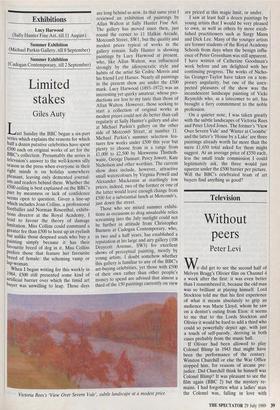Television
Without peers
Peter Levi
We did get to see the second half of Melvyn Bragg's Olivier film on Channel 4 a week after the first: it was even better than I remembered it, because the old man was so brilliant at playing himself. Lord Stockton told me that his first experience of what it means absolutely to grip an audience was Marie Lloyd, whom he saw on a dentist's outing from Eton: it seems to me that to the Lords Stockton and Olivier it would be hard to add a third who could so powerfully depict age, with just a touch of self-parody, deriving in both cases probably from the music hall.
If Olivier had been allowed to play Colonel Blimp in 1943 that might have been the performance of the century. Winston Churchill or else the War Office stopped him, for reasons of arcane pre- judice. Did Churchill think he himself was Colonel Blimp? It was pleasant to see the film again (BBC 2) but the mystery re- mains. I had forgotten what a ladies' man the Colonel was, falling in love with
Deborah Kerr three times at different ages. She looked like that ATS girl painted by Moynihan. In spite of worshipping Olivier, I must admit that Roger Livesey was classical in the part.
The Week in the Lords (BBC 2, 4 p.m., Saturday) was more of the same, because that highlight of the week is now over: we are to expect the buffoons of the House of Commons instead next season, and all our blood pressures are likely to rise in con- sequence. The hunger for publicity is unappeasable in the House of Commons, but as the late Lord Salter once remarked at an All Souls College meeting, 'In a long career in the public service I have always found publication a double-edged weapon', and the same may be said of television. The peers are more charming, more tranquil and more serious than the Lower House, and less maladroit in their wit, less passionate in their quarrels. Lord Mackay, for instance, had a mastery of his subject and of the House. I was amazed by his authority, far greater than Lord Hail- sham's, and only television could have conveyed it so immediately. Lord Hought- on of Sowerby was excellent on raving dogs. Maybe the presenter Christopher Jones was too intrusive, but after all that was his just prize at the end-of-term prize-giving of a programme that has been a delight.
Later that Saturday night my wife was watching a programme about Herbert von Karajan (BBC 2), about whom I used to nourish doubts because he was a Nazi and used to conduct the Horsewhistle or what- ever they call it. But I have decided such doubts are ridiculous, and I certainly admire him for refusing ever to discuss the subject. He just had a passion, a deep fit of devotion, for every note of German music, and why ever not? We saw him conduct Beethoven's Third Symphony, brilliantly and unrestlessly photographed for once, with his eyes tight shut from beginning to end, and an expression so rapt that I was hugely moved by it. I think it is the best film on an artist at work I have ever seen. John Drummond introduced it with pleasant enthusiasm, but I wanted more formality until suddenly von Karajan en- gendered just that. You could hear the hush behind the music.
Most television this week was a failure: a pity, because we have got beyond the stage where it is too hot to be indoors to the further stage where we crouch in a cave- like coolness watching Colonel Blimp (if lucky) in mid-afternoon. Norman Lewis introduced The Trial of the Godfathers (BBC 2) very well, but the English stifled too much of the Italian. I missed Take Six Cooks (Channel 4, 8.30 p.m., Thursday) with Michel Bourdin of the Connaught making hors d'oeuvres: I can only hope for yet another repeat because I am certain the Connaught make the best hors d'oeuvres in the world. I have their menu framed, mocking me.



















































 Previous page
Previous page